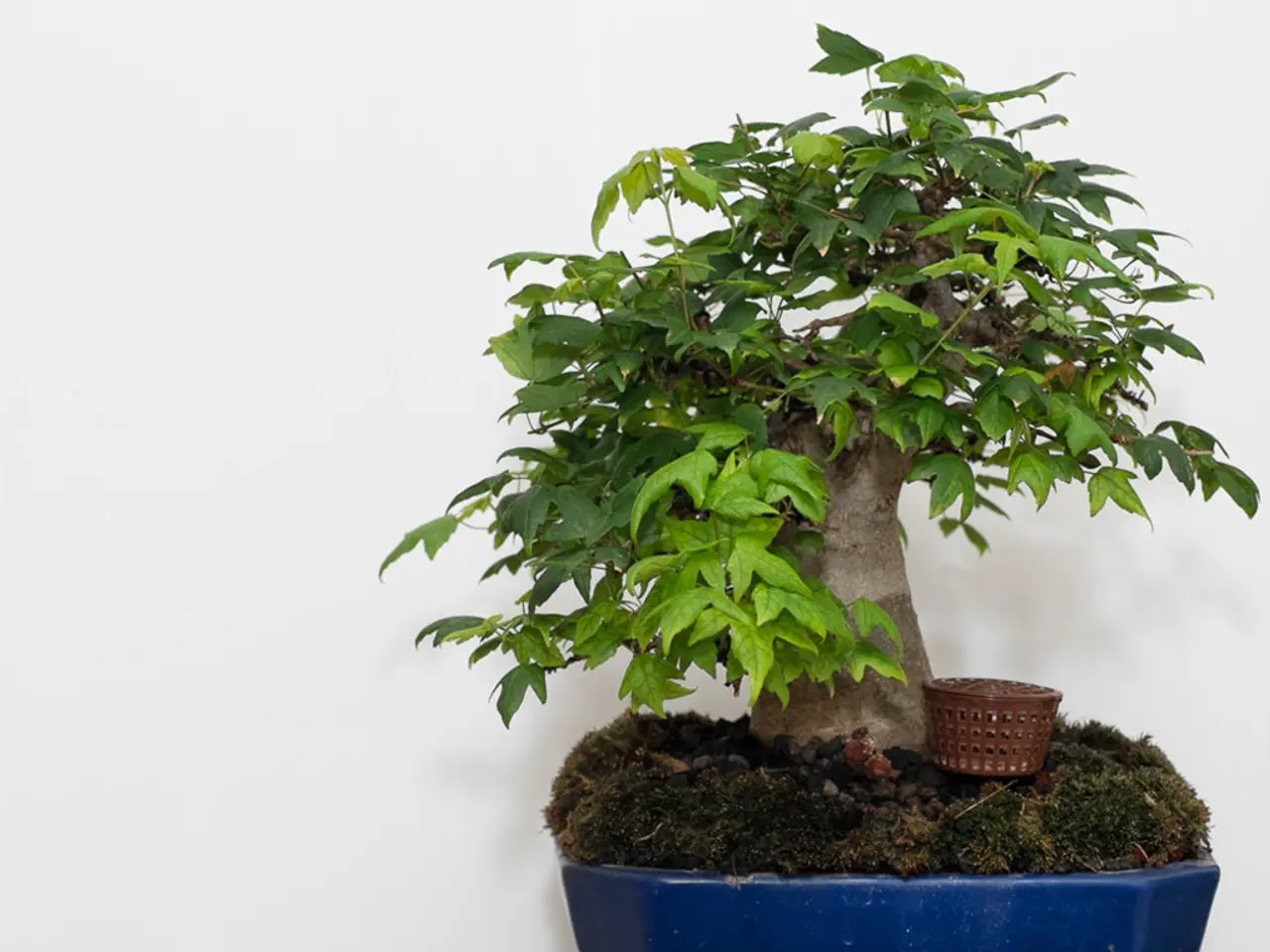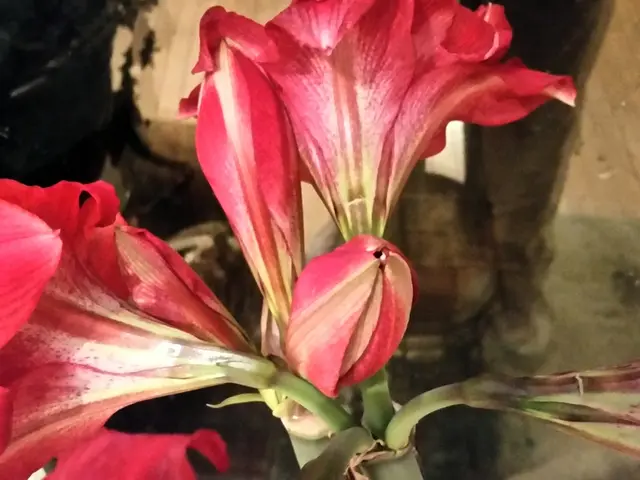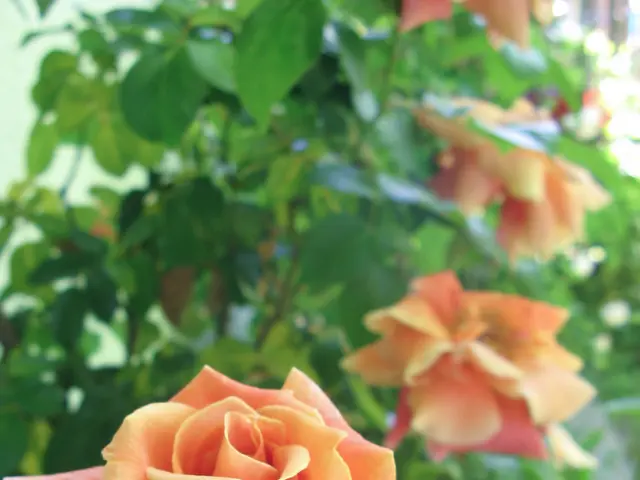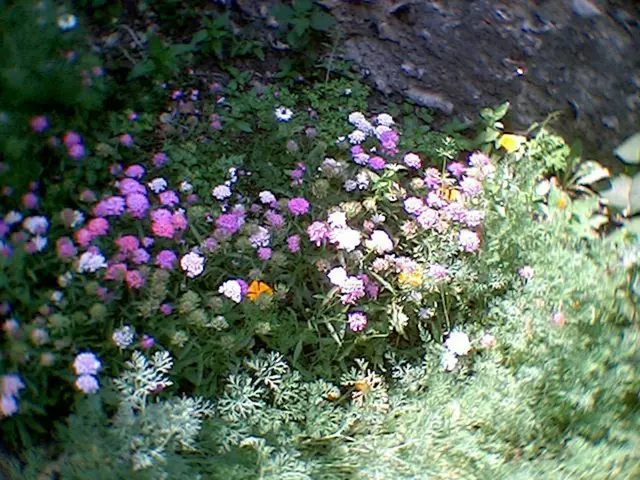Tropical Bonsai Varieties and Cultivation: Selecting Suitable Species for Warm Climates with Occasional Cold Spells
In the vibrant world of bonsai, subtropical species such as Ficus, Juniper, Olive, Pomegranate, and Elm are popular choices for enthusiasts due to their resilience and unique characteristics. To help these trees thrive, it's essential to understand their specific needs regarding temperature, watering, humidity, and light.
### Ficus (e.g., Ficus tiger bark)
Ficus bonsai prefer warm conditions, ideally not below 50°F (10°C). They thrive indoors in temperatures ranging from 60°F to 75°F. Careful watering is crucial to keep the soil moist but not soggy, with a recommended technique of watering abundantly, waiting a moment, then watering again 2-3 times to ensure deep saturation. Avoid letting the soil dry out completely, but also avoid overwatering. Moderate humidity is beneficial, and Ficus bonsai benefit from leaf washing or foliar fertilization, especially indoors during colder months. A well-draining, aerated substrate that balances moisture retention and nutrient availability is necessary for Ficus bonsai.
### Juniper
Juniper bonsai prefer cooler subtropical climates and need protection from extreme cold below freezing. Watering should keep the soil slightly moist but prefer drying out somewhat between watering to avoid root rot. Moderate humidity is suitable, and misting can help but is not strictly necessary. Juniper bonsai require full sun or bright light for healthy needle colour and growth.
### Olive (Olea europaea)
Olive bonsai are tolerant of warmer climates and can handle mild frost but should be protected from hard freezes. Moderate watering is required, with the soil drying slightly between watering, and avoiding waterlogging. Prefers drier air than tropical species, but consistent humidity helps avoid leaf drop. Full sun is necessary for best growth and fruiting potential.
### Pomegranate (Punica granatum)
Pomegranate bonsai prefer warm conditions, tolerating short periods of mild frost but needing protection below 30°F. Keep the soil evenly moist during the growing season but reduce watering in winter. Moderate to high humidity is preferred, with misting helpful. Full sun is essential for flowering and fruiting.
### Elm (Chinese Elm - Ulmus parvifolia)
Elm bonsai are hardy species that tolerate a range of temperatures, including cooler subtropical conditions. Keep the soil evenly moist, avoiding drying out completely. Moderate humidity is suitable, and the species is adaptable to indoor environments. Elm bonsai prefer bright indirect light or partial sun.
### Key Care Strategies Across Species
| Aspect | Ficus | Juniper | Olive | Pomegranate | Elm | |------------------|--------------------------|-------------------------|-------------------------|-------------------------|--------------------------| | **Temperature** | >50°F, avoid cold drafts | Avoid freezing temps | Warm, mild frost okay | Warm, protect <30°F | Tolerates cool to warm | | **Watering** | Keep moist, no dryness | Slightly dry between waterings | Moderate, avoid soggy | Even moisture, less in winter | Even moisture, no drying | | **Humidity** | Moderate, leaf washing helpful | Moderate, mist optional | Moderate, prefers some | Moderate to high | Moderate, adaptable | | **Light** | Bright indirect to some shade| Full sun preferred | Full sun | Full sun | Bright indirect to partial sun |
### Additional Tips:
- **Temperature tolerance:** Many subtropical bonsai species like Ficus and Norfolk Island Pine prefer temperatures above 50°F and can suffer if exposed to temperatures below 35°F. - **Humidity management:** Using a humidifier or misting can benefit species like Ficus and Norfolk Island Pine, especially indoors or in dry climates. - **Watering:** A common effective method for Ficus is watering thoroughly multiple times to ensure deep soil saturation. Avoid letting the substrate dry out completely but also prevent waterlogging by using well-draining soil. - **Fertilization:** During active growing seasons, regular, weak liquid fertilization is beneficial, especially for species with weaker root systems like Norfolk Island Pine.
These species-specific tips can help maintain healthy subtropical bonsai by mimicking their natural growing conditions and managing environmental stresses effectively. By following these guidelines, you can enjoy the beauty and resilience of Ficus, Juniper, Olive, Pomegranate, and Elm bonsai for years to come.
Gardening enthusiasts may find a harmonious combination of home-and-garden and lifestyle by cultivating bonsai trees from the subtropical species such as Ficus, Juniper, Olive, Pomegranate, and Elm. As these trees have unique needs in terms of temperature, watering, humidity, and light, understanding and implementing their specific care strategies can lead to thriving bonsai that complement one's living space.








